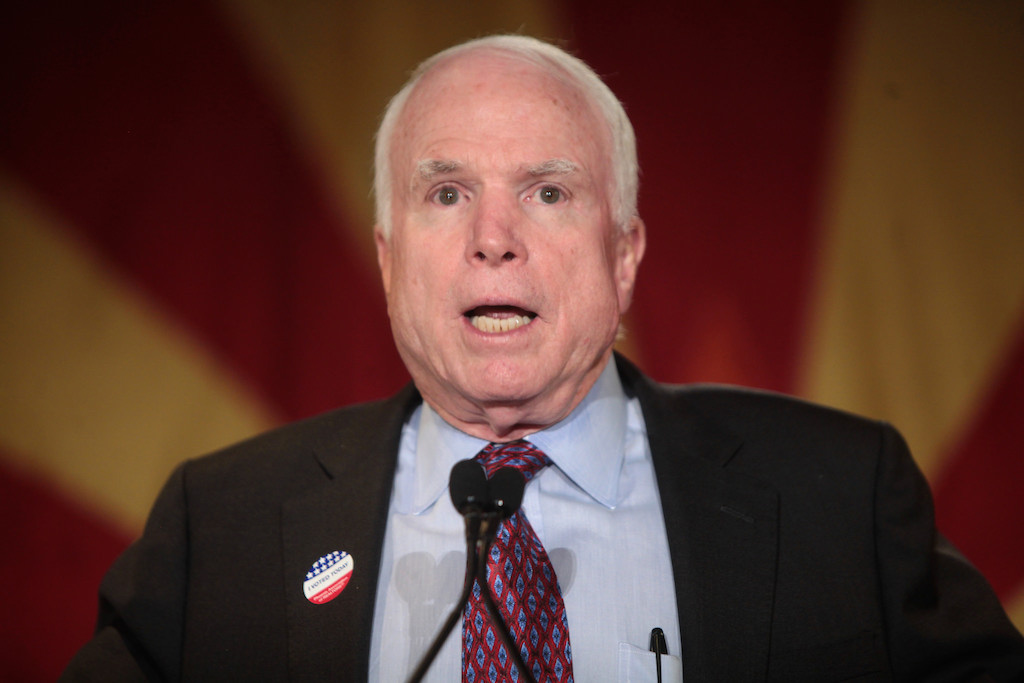‘Human Rights Champion’ John McCain Silent on Efforts to End War Crimes in Yemen
When will the senator acknowledge Saudi Arabia's abuses in the poorest country in the Arab world and act? Sen. John McCain. (Gage Skidmore / CC BY-SA 2.0)
Sen. John McCain. (Gage Skidmore / CC BY-SA 2.0)
Last week, Sen. John McCain wrote an op-ed in The New York Times with Angelina Jolie, lamenting a lack of “action” on protecting the Rohingya. The article, well-argued and appealing to our better angels, laid out the urgency and outrage of the ongoing ethnic cleansing of the Muslim-minority group in Myanmar. It’s one of a half-dozen columns penned by the Arizona senator over the past year lobbying for “human rights” and for the United States to “take action” on them, with varying degrees of specificity and militarism.
Yet the ongoing human rights crisis McCain has the most influence to do something about—the brutal, indiscriminate bombing of Yemen by Saudi-led forces—has not only been met with silence from the senator, but he has more often than not backed the country responsible for the disaster: Saudi Arabia.
A new bill authored by Sens. Bernie Sanders, I-Vt., Mike Lee, R-Utah, and Chris Murphy, D-Conn., to end U.S. support for Saudi Arabia and its bombing campaign—a campaign that, by the latest accounts, has killed over 13,000 civilians and caused upward of 1 million cholera cases—has yet to see any support from McCain. Indeed, in 2017, the last and only real time those in the U.S. Senate made an effort to end U.S. backing of the siege of Yemen, McCain voted against a measure to end arming Saudi Arabia in response to its war crimes. “Thank God for the Saudis,” McCain said in 2014. It appears his position has yet to change.
During the three-year siege of the poorest country in the Arab world by Saudi Arabia, the United Kingdom, the U.S. and other Gulf allies, McCain has repeatedly voted in favor of selling the absolute monarchy weapons and protected it in Congress from efforts to curb its human rights abuses, offering only the occasional mild chiding.
As McCain polishes his PR image as a human rights champion, doing the media rounds and writing columns, those in the press need to ask him why he is silent on the human rights abuses he can actually do something about. McCain has tremendous, if not deciding, purchase over ending the Saudi bombing of Yemen (unlike bombings committed by Russia or China or other countries). U.S. backing isn’t merely incidental, either. As senior fellow at the Brookings Institution and 30-year CIA veteran Bruce Riedel—hardly a radical lefty—argued in 2016: “if the United States and the United Kingdom, tonight, told King Salman, ‘This war has to end,’ it would end tomorrow. The Royal Saudi Air Force cannot operate without American and British support.”
This is a decision Congress can make this week and one McCain could have a potentially dispositive influence over. But he chooses not to because McCain—like many of those responsible for U.S. foreign policy—appears to care about human rights only insofar as they advance American interests. Or, at the very least, only insofar as they don’t upset those interests. The senator infamously cut off a reporter’s question two years ago over the McCain Institute receiving a $1 million donation from Saudi Arabia.
Just as with his support for the invasion of Iraq in 2003 that left hundreds of thousands of Iraqis dead or for Israel’s 2014 bombing of Gaza that killed over 1,500 civilians, McCain’s concern over human rights is, at best, selective and, at worst, self-serving.
For “human rights” to be more than a branding exercise, McCain can lend his tremendous influence to ending one of the globe’s major humanitarian disasters. This isn’t mere posturing or point scoring: By throwing his considerable weight behind the bill, McCain could finally end the moral stain of U.S. support for war crimes in Yemen. Organizations from Human Rights Watch to Amnesty International to OxFam—to the United States’ own State Department—have acknowledged Saudi Arabia’s human rights abuses in Yemen. When will America’s supposed protector of human rights, John McCain?
Your support matters…Independent journalism is under threat and overshadowed by heavily funded mainstream media.
You can help level the playing field. Become a member.
Your tax-deductible contribution keeps us digging beneath the headlines to give you thought-provoking, investigative reporting and analysis that unearths what's really happening- without compromise.
Give today to support our courageous, independent journalists.






You need to be a supporter to comment.
There are currently no responses to this article.
Be the first to respond.